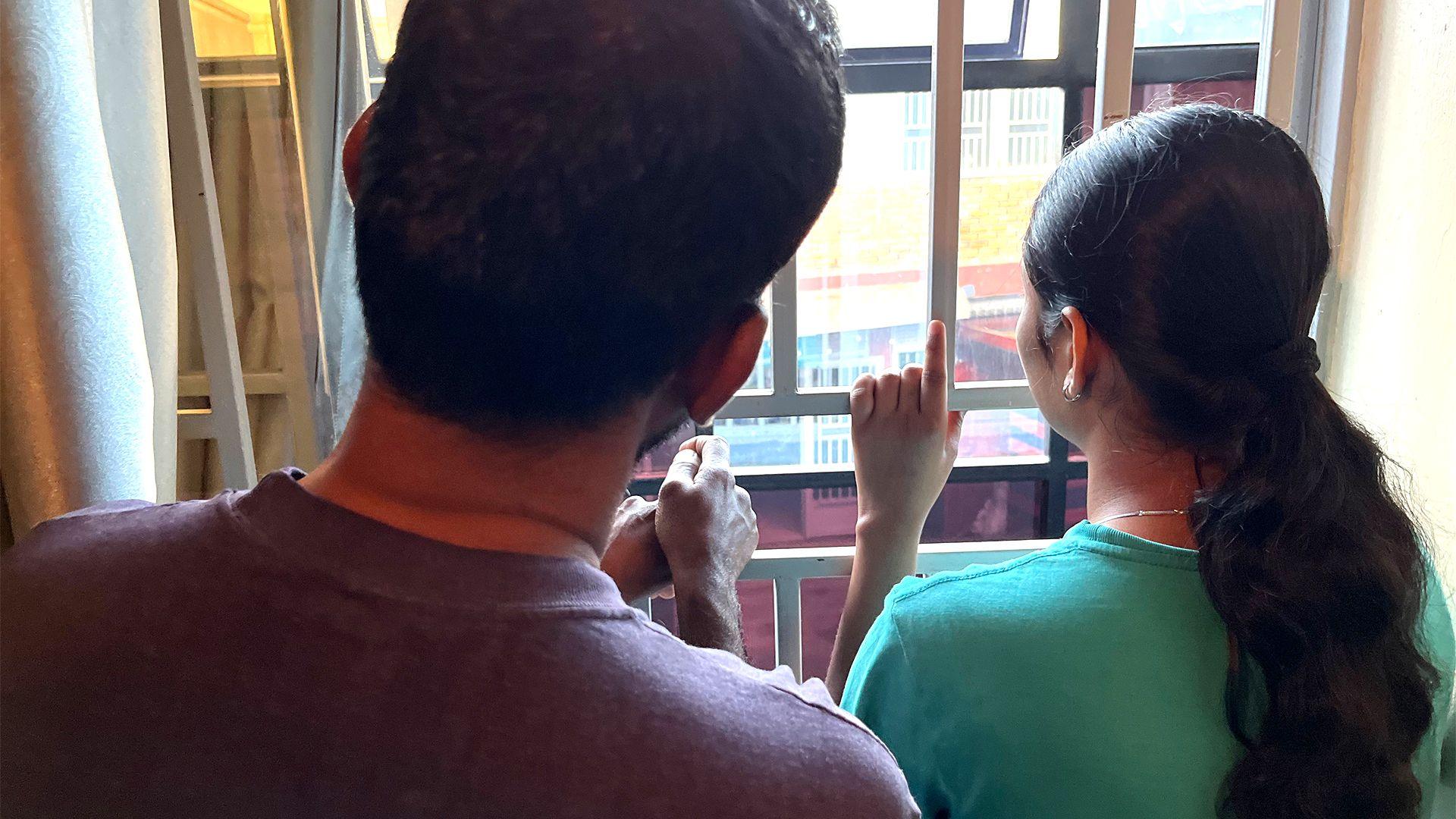US blocks British court from British territory
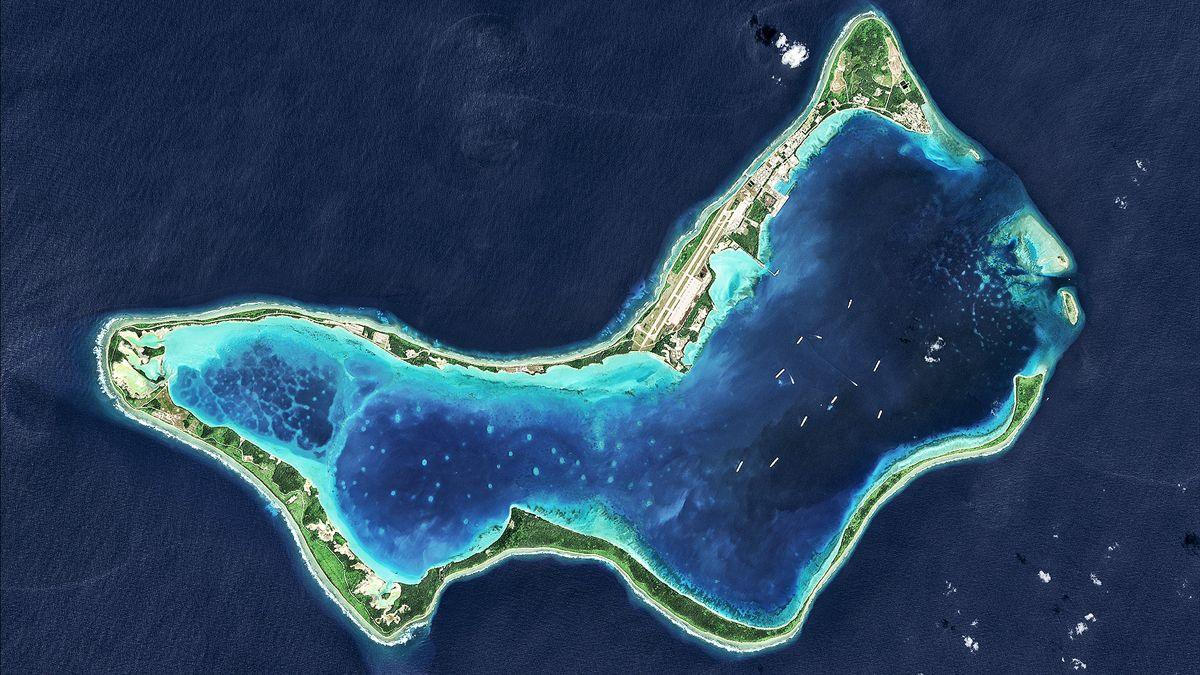
- Published
The US government has blocked a British court hearing from taking place on a British territory, citing security concerns, according to official documents.
The supreme court of British Indian Ocean Territory (Biot) was due to hold a hearing this week, attended by the BBC, on whether a group of migrants was being unlawfully detained on the island of Diego Garcia.
The island hosts a secretive UK-US military base and access is heavily restricted.
The US last week said it was “withdrawing its consent” for lawyers representing the migrants and “members of the press” - the BBC - to access the island, according to official communications we have seen.
It said it would not allow participants of the hearing to board US military flights to Diego Garcia and would not provide “housing, transportation, and food for the visit”.
The US said it would be “willing to reconsider” if the visit was “conducted in a manner” that addressed its “security and operational concerns”.
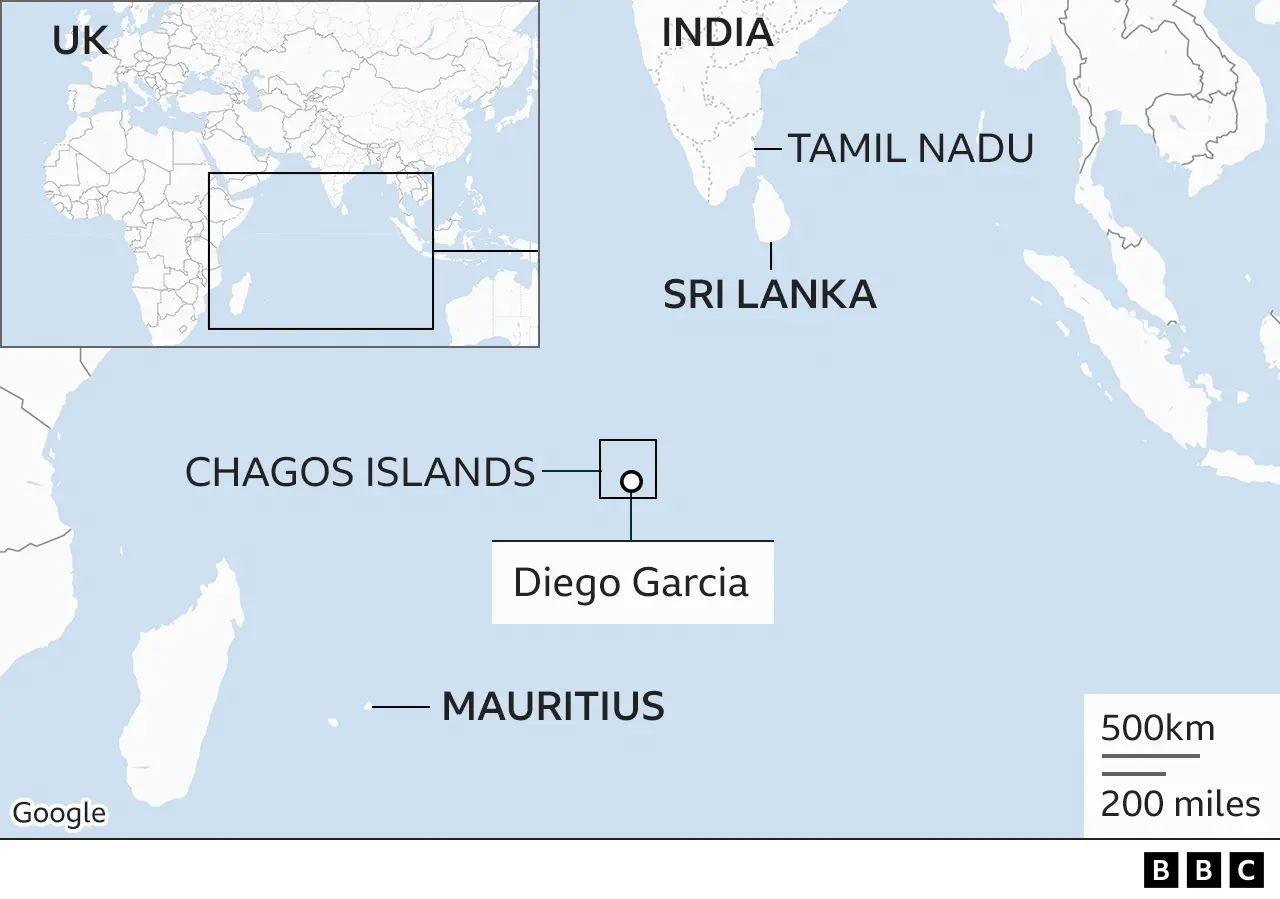
Dozens of migrants arrived on the island in October 2021, saying they had been fleeing persecution and trying to sail to Canada to claim asylum when their boat ran into trouble near Diego Garcia.
Late last Thursday night - hours before the judge, UK government lawyers and those representing the migrants, and the BBC were due to board flights for the first leg of the journey - the court shared an order cancelling the hearing.
The US security concerns relate to a site visit that had been scheduled to take place on the island as part of the hearing, which was to include the migrant camp and several other areas of Diego Garcia.
In a communication on 3 July, entitled “United States Notification to the United Kingdom of denial of the 6-12 July 2024 visit by of [sic] the Biot Supreme Court to Diego Garcia”, US authorities said the site visit presented “risks to the security and effective operation” of the base.
It had previously said it was willing to allow access to areas including the migrant camp, beaches around it and a chapel where children receive schooling.
But it had said it would not provide access to areas “open to civilian contractors and other non-military personnel”, such as a movie theatre, a barber and a bowling centre, the airport terminal and “all US-controlled areas occupied by the Biot administration, the Royal Overseas Police, and the Royal Navy”.
Court documents filed on behalf of Biot’s commissioner state that the reasons for the island's US military commander's decision were “confidential and based on the US’s assessment of its own national security needs”.
Tom Short, a lawyer from the UK firm Leigh Day which is representing some of the migrants, said the cancellation of this week’s hearing had been “a devastating blow to our vulnerable clients”, and called for it to be rearranged as soon as possible.
“Our clients have ceded to US demands that the site visit exclude certain US-controlled buildings (such as the gym and swimming pool where US cheerleaders and celebrity chefs visited earlier this year) as well as facilities such as the Turner Club and Golf Club (which Biot and FCDO civil servants frequent).
“It is of paramount importance to our clients that the Judge see the detention camp and that they attend a hearing in person,” he added.
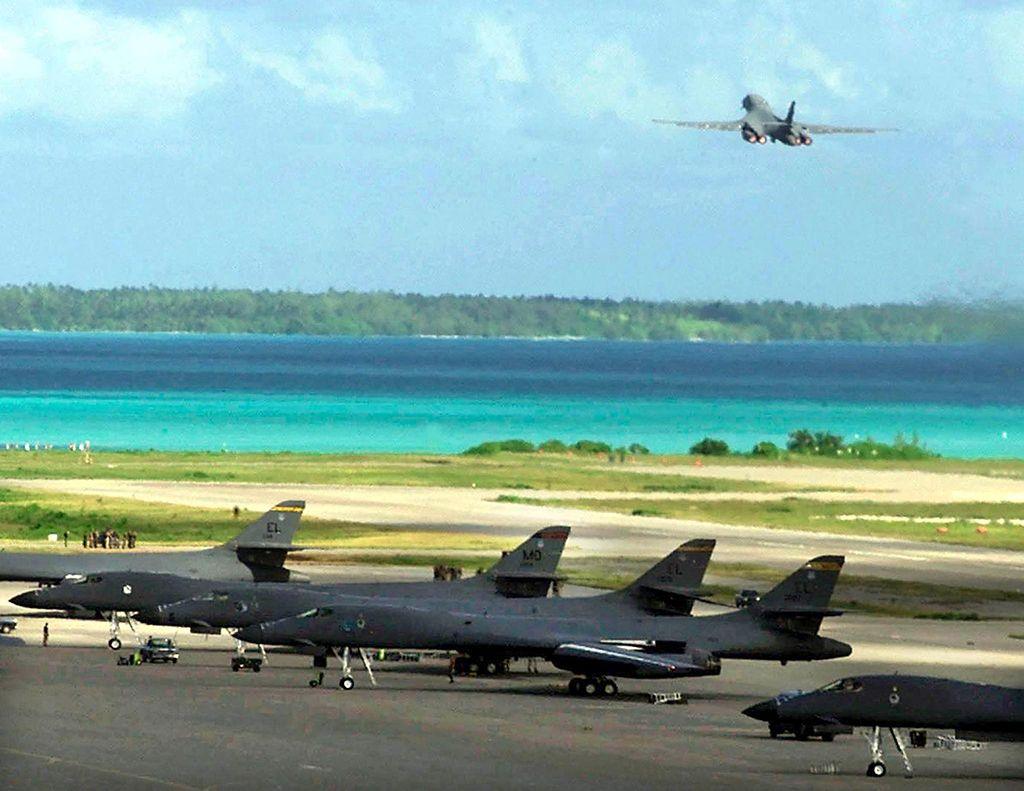
A US Air Force bomber takes off from Diego Garcia in October 2001
A virtual court hearing on Tuesday, attended by lawyers in London and the migrants in Diego Garcia, sought to determine the next steps in the case as discussions between the UK and US governments continue.
Speaking after the hearing, migrants told the BBC of their disappointment at this week’s hearing being cancelled.
“It has taken away all our hope,” one woman said. “We have been stuck in this place for almost three years. We were hoping that this hearing would provide us some relief.”
The UK took control of the Chagos Islands, of which Diego Garcia is part, from its then colony, Mauritius, in 1965. It went on to evict its population of more than 1,000 people to make way for the military base.
Agreements signed in 1966 allowed for an initial 50-year period of US use of the territory, plus a further 20 years. The agreement was then “rolled over” in 2016, and is now set to expire in 2036, according to the Biot website.
Biot is administered from London but is described as being "constitutionally distinct” from the UK.
Mauritius, which won independence from the UK in 1968, maintains that the islands are its own and the United Nations' highest court has ruled that the UK's administration of the territory is "unlawful" and must end.
Most personnel and resources on Diego Garcia are under the control of the US, including the majority of the accommodation and transport on the island as well as restaurants and shops.
The US military commander can refuse access to areas operated or controlled by the US military for security reasons.
In a witness statement, Biot’s deputy commissioner, Nishi Dholakia, said it was not possible to “make alternative arrangements to replace the logistical support which the US was due to provide” in time for the scheduled court hearing this week.
The room where the hearing had been scheduled to take place was only usable with US co-operation, he said.
Biot's official website states access to the island is only permitted to “those with connections either to the military facility or to the Territory’s Administration”.
Full report: Migrants stuck in "hell" on UK military island (June 2023)
- Published11 June 2023
Diego Garcia has been described as an important strategic base for the US. Earlier this year, two B-52 bombers were sent there for training exercises.
In recent decades, US planes have been sent from the base to bomb Afghanistan and Iraq.
The UK government has confirmed that rendition flights landed on the territory in 2002 to refuel there, though former CIA director Michael Hayden has denied reports that it has ever been used to house and interrogate terror suspects.
The dozens of Sri Lankan Tamils who landed on the island in October 2021 are the first people to file asylum claims on Biot. About 60 people, including at least 16 children, remain there - guarded by private security company G4S - as complex legal battles are fought over their fate.
This week’s hearing was due to be the first time that they would meet their lawyers in person. There have been multiple suicide attempts on the island, and reports of sexual harassment and assaults allegedly committed by migrants within the camp.
Some migrants have been flown to Rwanda for medical treatment following self-harm and suicide attempts, and those with successful claims are waiting for a “safe third country” to be identified to resettle them in.
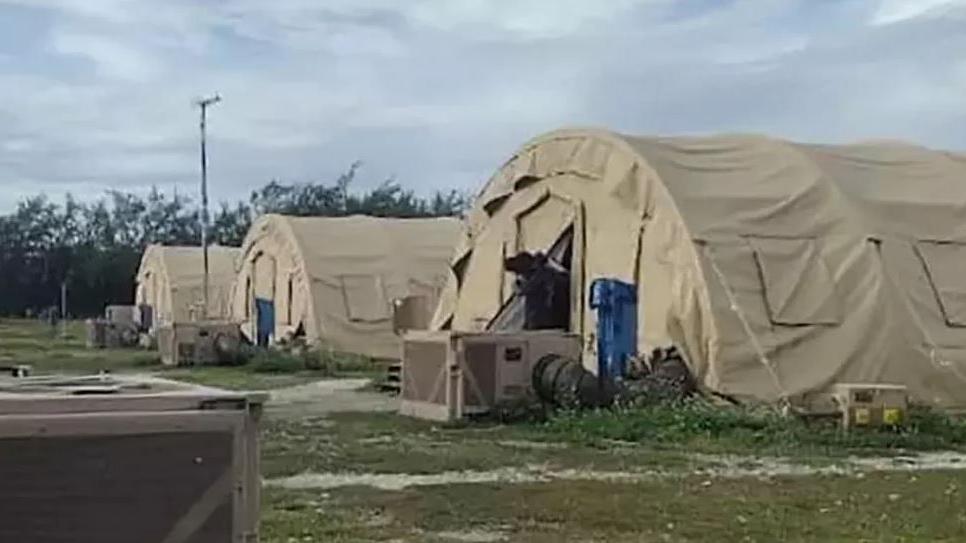
An image previously sent to the BBC by a migrant shows the housing tents on the island of Diego Garcia
United Nations representatives visited the camp late last year and reported that conditions there amounted to arbitrary detention.
During Tuesday’s virtual hearing, one of the migrants on the island collapsed multiple times.
The Foreign Office has previously told the BBC that the island is not suitable for migrants to live on and that it is “working tirelessly to process the migrants' claims for protection and to find a suitable third country for those whose claims are upheld”.
“At all times, the welfare and safety of migrants on Biot has been our top priority,” it said earlier this year.
Additional reporting by Swaminathan Natarajan
Related topics
- Published19 January 2024
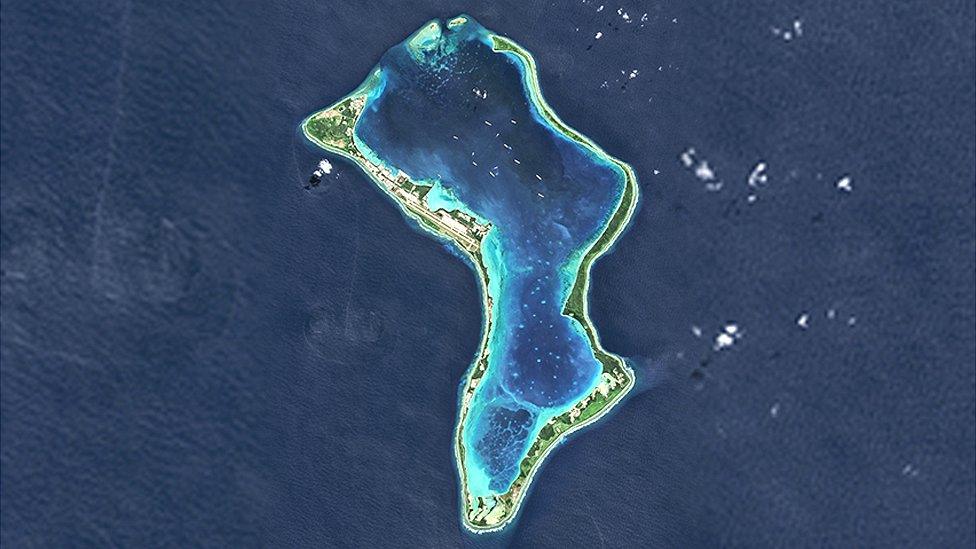
- Published7 June 2024
